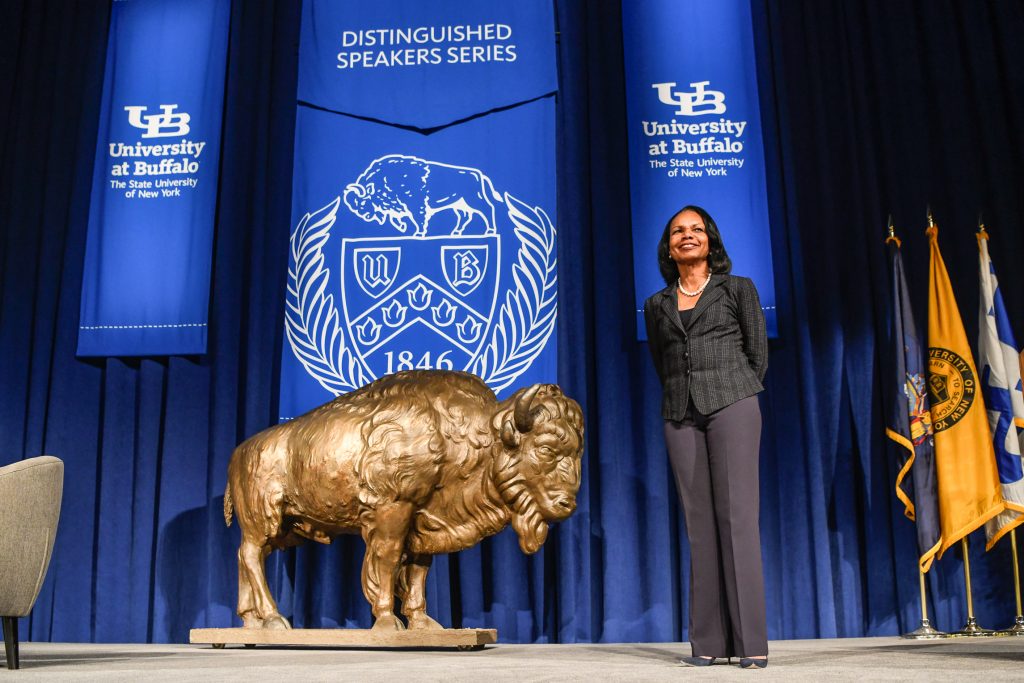
At UB, the former Secretary of State shares her perspective on gender and leadership

If you are anything like me, you think a lot about leadership and the type of leadership we need in today’s world.
At the UB School of Management’s Center for Leadership and Organizational Effectiveness (CLOE), we believe that personal stories of leaders, in various professions, are incredibly valuable. We set out this year, for the first time, to ask every leader featured in the UB Distinguished Speakers Series—from Vice President Joe Biden to activist and author Angela Davis—a unique question on leadership to provide a takeaway that audience members could apply to their own lives.
In preparation for our question for former Secretary of State Condoleezza Rice, the final speaker in the series, I came across an article about her negotiations with Russian President Vladimir Putin. She was quoted as saying, “If, by the time you’re secretary of state, you let somebody treat you badly because you’re a woman, it’s your fault—not theirs.”
Taken out of context, in the #MeToo era and the women’s empowerment movement, her statement could seem insensitive to the centuries of abuse, ignorance and harassment toward women. However, Rice wasn’t referencing harassment or assault—she was making a statement about leadership and the role of gender in high-level international relations. To understand this movement and how we can lead together, we wanted to know if her position has changed.
I asked her: “With historic levels of women representation in Congress and increasing female representation as CEOs, what do you see as the persistent challenges for women in leadership, and has your position evolved in any way regarding the responsibility women have for advocating for their leadership goals?”
Rice’s response was: “I’m a big believer that you advocate for your own leadership roles. You have to be, in that sense, your best advocate, meaning that you have to feel prepared, you have to be willing to walk into a room and say, ‘I’m going to own that room.’ And you have to be willing to say, ‘I’m not going to let anybody knock me off my horse because they react to me in a particular way.’
“Some of this is our responsibility as women to simply be strong enough to deal with what are difficult situations. Now, if you’re younger in those circumstances, that is why [it is important to] have mentors and people that can help you navigate. But if you’re CEO in a company, you’re secretary of state, you’re a senior faculty member, you’re president of a university—if somebody treats you badly because you’re a woman, it is your fault, not theirs. You have plenty of arrows in your quiver. I have been known to say to people, ‘Do you have a problem with me?’ You would be surprised how fast people back down if you call them on it, so some of it is taking the reins and refusing to be denied.
“Now, in order to do that, you have to feel really well-prepared. My parents had a saying. I grew up in segregated Birmingham, Alabama, and this is the way you were to deal with prejudice. They said, ‘You have to be twice as good.’ Now, they didn’t say that as a matter of debate; they said it as a matter of fact. And, so, we all went around trying to be twice as good, which meant we worked twice as hard, which meant we were twice as confident. And so I tell all of my students now—male, female, minority, majority—work twice as hard so you’re confident that you’re twice as good, and that will take care of a lot of those issues.”
As I reflected on Rice’s answer, I could see that leadership for her had nothing to do with gender or title. She exhibited confidence and perseverance long before she served as secretary of state.
I hope as people think about Rice’s position on leadership, they will see that equal, balanced and diverse representation of women and men is critical to creating a new era of inclusion and respect. When this happens, leaders will unite, not divide.
Molly Anderson is executive director of the UB School of Management’s Center for Leadership and Organizational Effectiveness (CLOE). CLOE is a proud sponsor of the 32nd annual UB Distinguished Speakers Series and featured a leadership question for each speaker.

Very good summary. Former Secretary of State Rice is someone I have always admired.